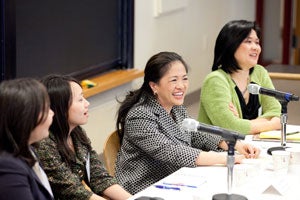The Harvard Law School Asian Pacific American Law Students Association hosted the 17th Annual National Asian Pacific American Conference on Law and Public Policy on February 25-26, 2011 with the assistance of the Harvard Kennedy School Asian American Policy Review.
Titled “Pathways to Progress: Conquering the Challenges of the 21st Century,” this year’s Conference challenged attendees to contemplate the meaning of progress, both at the Asian Pacific American (APA) community level and at the individual level. Hundreds of students came from law schools across the country, and from schools across the Harvard campuses, to examine their conceptions of progress.
Conference co-chairs Robin Achen ’12 and Katy Yang ’12 opened the conference at an evening reception on Friday, February 25 by encouraging attendees to consider what shape their own “pathways to progress” will take. “Our goal,” they said, “is to give you an opportunity to explore what progress means to you.”
The Saturday morning panels addressed current issues pertinent to the APA community. “Immigration: Recent Developments and Challenges,” co-sponsored by the Harvard Immigration Project, featured professors and practitioners who explored the immigration debate and focused on the difficulties of federal immigration reform. “Women in Leadership,” co-sponsored by the Harvard Women’s Law Association, presented a panel of successful APA women who provided candid and insightful advice to the next generation of leaders. “Their stories are not only encouraging,” commented Vivienne Wei, HBS ‘11, “but are good reminders of how we can give back to the community and help each other as we grow.”
 Kiran Ahuja [photo left], the Executive Director of the White House Initiative on Asian American and Pacific Islanders, delivered the luncheon keynote address. She shared her own experiences growing up in the racially-charged South, connected those stories with the experiences of conference attendees, and encouraged her audience to take an active role in striving for progress. Students and professionals alike said they appreciated her cautious view of traditional benchmarks for progress and were inspired by her call to action.
Kiran Ahuja [photo left], the Executive Director of the White House Initiative on Asian American and Pacific Islanders, delivered the luncheon keynote address. She shared her own experiences growing up in the racially-charged South, connected those stories with the experiences of conference attendees, and encouraged her audience to take an active role in striving for progress. Students and professionals alike said they appreciated her cautious view of traditional benchmarks for progress and were inspired by her call to action.
The afternoon panels presented attendees with the opportunity to hear about the experiences of a wide range of professionals on various career tracks. At “APAs in Media, Journalism, and Entertainment,” panelists discussed the challenges and triumphs they have encountered as APAs in areas where Asian Americans are traditionally typecast and vastly underrepresented. “Pioneers: APAs Breaking Barriers” presented panelists who have veered away from the beaten path to make their mark in “non-traditional” careers. Victor Ban ‘13, reflected: “I came away with a better sense of how to seek out mentors who will challenge and stretch me, as well as a firmer commitment to serving the Asian-American community in innovative ways.”
At “Community Mobilization and Politics,” community leaders and organizers shared stories of grassroots activism. “The Evolution of Diversity in Law Firms” featured stories and insights from APA partners at top law firms, providing tips for success and promoting the importance of mentorship. Students had the opportunity to connect with representatives from a number of law firms and several public interest organizations at the career fair that followed.
EEOC Commissioner Stuart Ishimaru capped off the evening with an insightful and humorous keynote speech during the closing banquet at the Sheraton Commander Hotel. In his speech, Commissioner Ishimaru considered several measures of advancement and concluded with a call to action, encouraging students to give back to the APA community as they chart their own pathways to progress.
